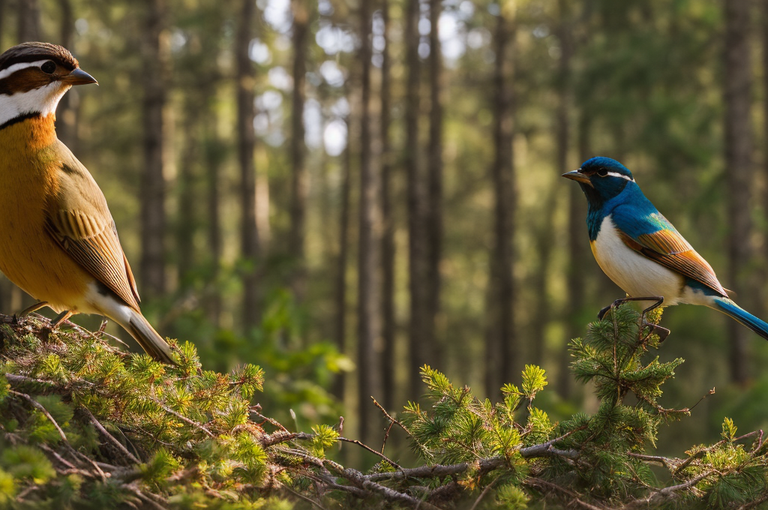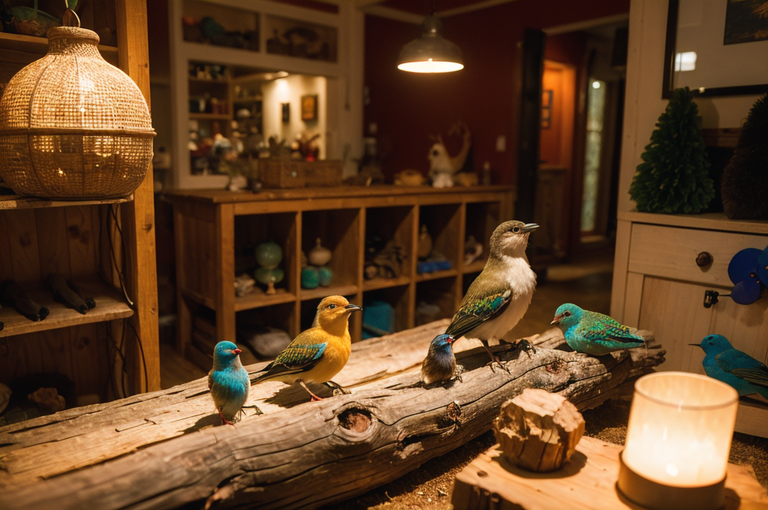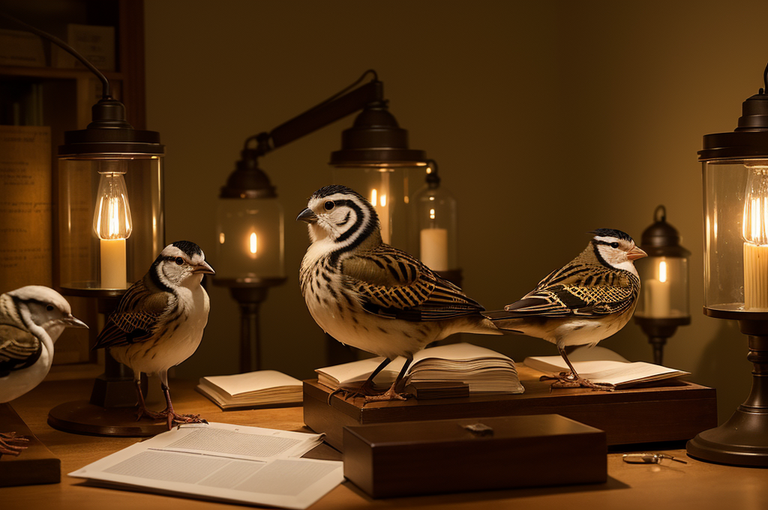Understanding the Importance of Detailed Items and their Occurrences

Penelope Callaghan, an ornithologist, blends academic insight with the untamed beauty of nature. Explore bird identification, observations, and responsible feeding. Discover ‘Sing Wild Bird Sing’ by Jacqueline Omahony.
My Life as an Ornithologist
Every day, as dusk casts a gentle glow upon the waking world, my life truly springs into action. My passion for birds isn’t confined to dusty libraries or stuffy research institutes. Contrarily, I am more akin to a wild nightingale, seamlessly threading together the academic rigour of ornithology with the raw, untamed beauty of nature. The product of my dedicated pursuit? An intriguing balance of crisp academic insight enlightened by the whimsy of the wild.
My relentless pursuit of avian truths has shaped both my career and lifestyle, resonating with the sentiment, sing wild bird sing jacqueline omahony. This peculiar note, albeit lacking apparent readability, authentically encapsulates the core essence of my life’s pursuit.
Observing and Learning
The real classroom for me is beneath the open skies. As an adventurer at heart, I spend countless hours observing birds in their natural environments. Drawn to the peculiar notes of different avian species, I jot down the unique nuances to further deepen my understanding. For examination alone cannot truly capture the innate beauty of a bird’s flight or the mesmerizing rhythm of their birdcalls.
Documenting and Sharing
The observations I gather during my informal studies find an outlet in my writing painted with the brush of my passion, polished by my academic knowledge. My articles are designed to engage, enlighten, and stir the curiosity within – inviting my readers to embark on a journey where no detail is insignificant, no bird merely ordinary.
Conclusion
From the lilting song of the lark to the haunting cry of the night owl, my work explores the poignant narratives hidden within each feathered creature. In my prose, you’ll find the tranquil tones of a pre dawn forest merging with the analytical rigour of a scientific dissertation. The shared journey of exploration and discovery always fills me with joy; one that I hope to impart to each reader along the way.
Through the pages of my work, I extend an invitation to join me in celebrating the enchanting world of birds where mystery meets beauty, and curiosity breeds knowledge. So, sing wild bird sing, and let us become one with the avian world.

Your Personal Observation for Bird Identification
As an ornithologist and avian aficionado, I often get asked about the best way to identify birds. Frequent outdoor jaunts, coupled with a keen eye, can significantly enhance your bird watching skills.
Importance of Observation
Your observational abilities play a significant role in identifying different species. A quick wild bird summary of each bird in your notebook helps enhance your recognition skills. Mirroring my father’s love of birds, I’ve spent countless hours observing them from different angles, noting unique features, and recording bird calls. Regularly doing so helps improve your ability to distinguish between different species.
Familiarize Yourself with Local Species
Although being aware of exotic bird species is a plus, it’s more beneficial to be familiar with the local avian population. Make a point to learn about native bird species in your area, as they are the ones you’ll encounter most frequently.
Identify Distinguishing Features
Each bird species bears distinguishing features that make them unique. This could be their size, beak shape, feathersor even their flights. Always have a keen gaze and keep note of such nuances.
Paying close attention to these tiny details will aid tremendously in your bird identification journey. In my case, it has led me not just deeper into the academic sphere but helped me appreciate the beauty of the natural world, and I’m certain it can do the same for you. In essence, all it takes is curiosity and a touch of persistence to become proficient in bird identification. As you delve deeper into this fulfilling activity, you too will find that no winged creature remains just a bird under your insightful gaze.

Minding What Ducks Eat
Diving into the question at hand like a mallard on a fish, can ducks eat wild bird feed? Highlights our intrinsic interest in the well being of our feathered friends. Yes, ducks can consume wild bird feed, though it might not offer them all the nutrients they need.
Exploring Their Dietary Needs
At first light, while tucking into my cereal, I often observe the ducks seamlessly blending into the serene lake nearby. This scene invites a consideration of their dietary needs. Ducks rely heavily on a diet of invertebrates, seeds, and aquatic plants. Wild bird feed, a medley of sunflower seeds, cracked corn and wheat, is not entirely out of the realm dietary benefits for them. However, it lacks certain essential nutrients which ducks require, like niacin, which aids in their growth and development.
Understanding the Implications
As the day transcends into twilight, my enduring inquiry into the world of birds compels me to decode the potential implications. Continual reliance on bird feed, with its insufficient niacin, may lead to leg and beak deformities in ducks, affecting their ability to waddle or forage. Contrary to popular belief, even feeding ducks bread is harmful, as it holds little nutritional value and can cause obesity and other health issues.
The Right Bird Feed
As the stars twinkle above and the creatures of the night awaken, one could argue for the modification of wild bird feed to specifically cater to ducks. Introducing supplements like mealworms, peas, oats, or duck pellets can ameliorate the nutritional gaps. This provides the ducks with not only a varied diet, but also a balanced one.
Penelope Callaghan, in the peaceful hush of the night, encourages responsible feeding habits. So, let’s remember our winged friends and ensure we are mindful of what they nibble on, for every creature has its unique dietary requirements. Every bird, from the purple martins in our backyards to the regal eagles soaring in the Alaskan skies, deserves a chance at optimal health, just as we do.

The Diet of Ducks
Just before sunrise today, I found myself pondering over a seemingly absurd question while preparing a feed mix for my avian friends: can ducks eat wild bird food? And after some thorough consideration, I can confidently assure you that yes, indeed, ducks can consume wild bird food without any negative repercussions.
A Duck’s Dietary Spread
I have observed, during those quiet mornings near marshes and ponds, that ducks are, inherently, omnivorous creatures. They delight in foraging for a variety of foods such as mollusks, insects, small fishes, and even amphibians. It’s quite the spectacle to witness their love for this diversely aquatic menu.
The Bird Food Compatibility
However, when it comes to the question of can ducks eat wild bird food, the answer is a resounding yes. One common ingredient in many bird foods is the humble yet nutritionally packed seed. Ducks, much like their other avian counterparts, do enjoy their fair portion of seeds millet, corn, sunflower – you name it.
The Accommodating Duck Palette
I have often found, scattered across ponds, fragments of bread and cereals, samples of human benevolence for these gentle beings. Ducks relish these morsels, further emphasizing their adaptable palettes. So, if you find yourself with a handful of bird food and a team of hungry ducks, rest easy knowing they can partake in the feast.
In essence, while Ducks can draw sustenance from a variety of sources, bird food undoubtedly fits the bill. Balancing their diet with other natural sources like insects and aquatic plants, however, is crucial to their health. Hence, the next time you ponder over the question: can ducks eat wild bird food, recall our morning discussion and throw a handful their way without any hesitation.
The Magical Essence of Birds
As the dawn breaks, like the early lark, I find myself drawn into the world of avian wonder. Jacqueline Omahony, in her book ”Sing Wild Bird Sing,” aptly captures the beauty of our feathered friends, essentially similar to my own experiences. The book is an amalgamation of narratives about birds, their behaviors, their enchanting songs and their dominance of the skies. Throughout its pages, it paints a poignant portrait of nature’s avian artistry, resonating strongly with my deep rooted love and appreciation for birds. A splendid exploration for anyone striving to appreciate avian life more closely, I cannot stress the book’s intense and raw look into the world of birds and nature.
As an ornithologist, I’ve often been asked, Can ducks eat wild bird feed or wild bird food? Well, ducks indeed can consume generic bird food, but a specialized diet can provide them with a more balanced and comprehensive nutritional profile. Ducks, while they are a part of the avian family, have specific dietary requirements that generic bird feed might not fulfill adequately, leading to malnutrition.
I believe that understanding each bird species and respecting their dietary habits is of utmost importance for their survival and wellbeing. Especially when it comes to ducks, providing balanced nutrition tailored to their unique needs ensures their consistent growth and health.
And finally, let us talk about the Wild Bird Summary. If asked to summarize a day in a wild bird’s life, it would involve the tranquility of dawn, the rigor of survival, the magic of nurturing new life and the beauty of flight. There is a rhythmic pattern in their existence that is both captivating and enlightening. Their story is an amalgamation of struggles, triumphs, and survival.
So next time you see a bird, may it remind you of this magical essence that they carry within. This world of feathers, flights, and songs is not just theirs, but ours to share as well. Remember, no winged creature remains just a bird under an insightful gaze.


